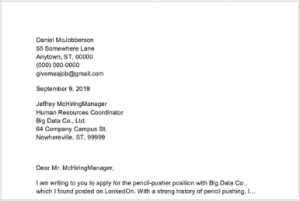Do You Need to Include the Company’s Address (or Yours) on a Cover Letter?

It seems to be common practice to include the company’s address on a cover letter … but do you really need to? Actually, no. Here’s an expert guide on how to write a cover letter without a company address to save valuable space.
Updated January 2024.
By: Katelyn Skye Bennett | Contributor for Let’s Eat, Grandma
Why is abbreviated such a long word? Why isn’t phonetic spelled the way it sounds?
Ready for more job search help?
Sign up for a free Senior Writer Resume Critique to see what’s holding you back from landing interviews. One of our top professional resume writers will give you personalized feedback on the top 3 items you can improve based on our expert practices!
And why, oh why, do some “experts” still stay it’s common practice to include the company’s address in the heading of a cover letter?
Many cover letter templates still show the intended company’s full physical address (sometimes after the applicant’s full physical address), with each address item on a new line.
This takes up at least a third of the page before getting to the actual letter.
But why?
In a world where cover letters are submitted via email or directly uploaded to online applications, is this still necessary?

Photo by Brooke Cagle on Unsplash
Should I put the company address on a cover letter?
Here at Let’s Eat, Grandma, we maintain you don’t need to put the company address on a cover letter anymore.
Of course, it’s likely that including the company’s address is not going to hurt you, but there’s really no point since you aren’t sending the letter by snail mail. The address will just take up space, and the formality doesn’t carry any real meaning.
And, since including the company address in a cover letter is an outdated practice, you may set yourself up for ageism by doing it.
Instead, put your effort into addressing the hiring manager by name and creating compelling body content.
Wayyy back in 2012, Forbes wrote about changing formats and the importance of concision in the midst of changing norms about cover letters. They caught the gist of this issue a decade ago by pointing out the importance of content over format.
Your reader cares about what’s in your cover letter, not about an arbitrary formality, such as reminding them where they’re located.
Still not convinced that you should submit your cover letter without the company address, though? Maybe you’re still thinking, “Better safe than sorry.”
Fair enough, but let’s break it down a little further.
Let’s Eat, Grandma is here to support you every step of the way in your job search journey. Request a free resume critique today for honest feedback from a senior resume writer on your resume, and take the first step toward securing your dream job.
3 reasons not to list a company’s address on a cover letter
1. It’s unnecessary information in our virtual age
You’re likely submitting your application to a company online, rather than to their physical address.
Have you ever actually mailed a cover letter as a physical letter to a company in the last 20 years? If you have, well, you won’t need to for your next application.
The company may even be remote at this point, not operating out of its mailing address as it did in pre-COVID years.
Either way, you’re going to be submitting the application electronically, and they know their own location.
2. It makes your format look outdated
Etiquette evolves with time. This aspect of cover letters hasn’t been much discussed in the public realm, unlike the development of applicant tracking systems, but the times have still changed.
Companies may have thought that including their address at the top of a cover letter was a polite formality in times past, but it’s difficult to imagine a recruiter today thinking, “Oh, they didn’t include our address? What an uncultured buffoon! No one with these improper manners will set foot in my establishment!”
And as we mentioned before, using an outdated format could even work against you. Unfortunately, ageism is a concern in the hiring world, and using a cover letter convention from 20+ years ago could lead to unhelpful assumptions.
3. It’s a waste of space
Look at all that space taken up with of information that no one is going to read.
The body is the part that matters, since it’s where you introduce yourself to the employer and elaborate on why you’re a good fit for the job. Your vivid examples and compelling, perhaps transferable skill sets look best within half to three-quarters of a page.
Wasting space with the company’s address on multiple lines in your cover letter limits you and gives you less space to express yourself.
Of course, including the company’s address in the cover letter may not be a major turn-off compared to having a sloppy body, using an unprofessional email address, or not including a cover letter at all.
But it’s simply unnecessary at best, and a waste of precious space at the worst.

Photo by Yannik Mika on Unsplash
Should you include your own address on a cover letter?
Now that we’ve got that straight, what about your own address?
Just like on your resume, there’s no need to include your full address or ZIP code on a cover letter (i.e., your street address).
That said, you should include your general location so hiring manager knows your home base. This can be a city “Phoenix, AZ” or area, “Denver Metropolitan Area, CO.”
If you live in a small town near a large city, but you’re fine with commuting to that city for work, you can put the larger city name.
This applies even if the job is a remote job. Some employers want to make sure you’re in the same country, region, or state as the company location, even if you never have to physically go in to the office.
We advise using the same header for both your resume and cover letter, and this should include your name, city, email address, phone number, and LinkedIn profile URL.
Pro Tip: You can also repeat the email and phone number again as a CTA in the last paragraph of your cover letter. This way, you can be absolutely sure the company will know how to reach you.
So there you have it. Write your next cover letter without the company address or yours, and you’ll have so much more room for the stories, values, and personal voice that will actually help you get hired.
Let’s Eat, Grandma is here to support you every step of the way in your job search journey. Request a free resume critique today for honest feedback from a senior resume writer on your resume, and take the first step toward securing your dream job.

Photo by The Jopwell Collection on Unsplash
Who should I address my cover letter to?
Now that you have the heading down, let’s talk about the salutation for a minute.
When crafting a cover letter, addressing it to the right person can make a significant impact on your job application. This means you should make an effort to avoid the formal and archaic “To whom it may concern.”
Ideally, you should address your cover letter to the hiring manager or the person responsible for making hiring decisions. This is often listed in the job description, especially if you found the job on LinkedIn, or if the listing requests that you email the application materials to HR.
If the job listing does not specify a name, take the time to research the company’s website or LinkedIn to find the appropriate contact. Addressing the letter to a specific individual not only personalizes your application but also demonstrates your initiative and attention to detail. If you are unable to find a name, using a professional greeting such as “Dear Hiring Manager” is acceptable, but personalized salutations will always give you an edge in making a strong first impression.
Interested in learning more about addressing your cover letters? We discuss this topic and more on this Career Warrior podcast episode.
Ready for more job search help?
Sign up for a free Senior Writer Resume Critique to see what’s holding you back from landing interviews. One of our top professional resume writers will give you personalized feedback on the top 3 items you can improve based on our expert practices!

